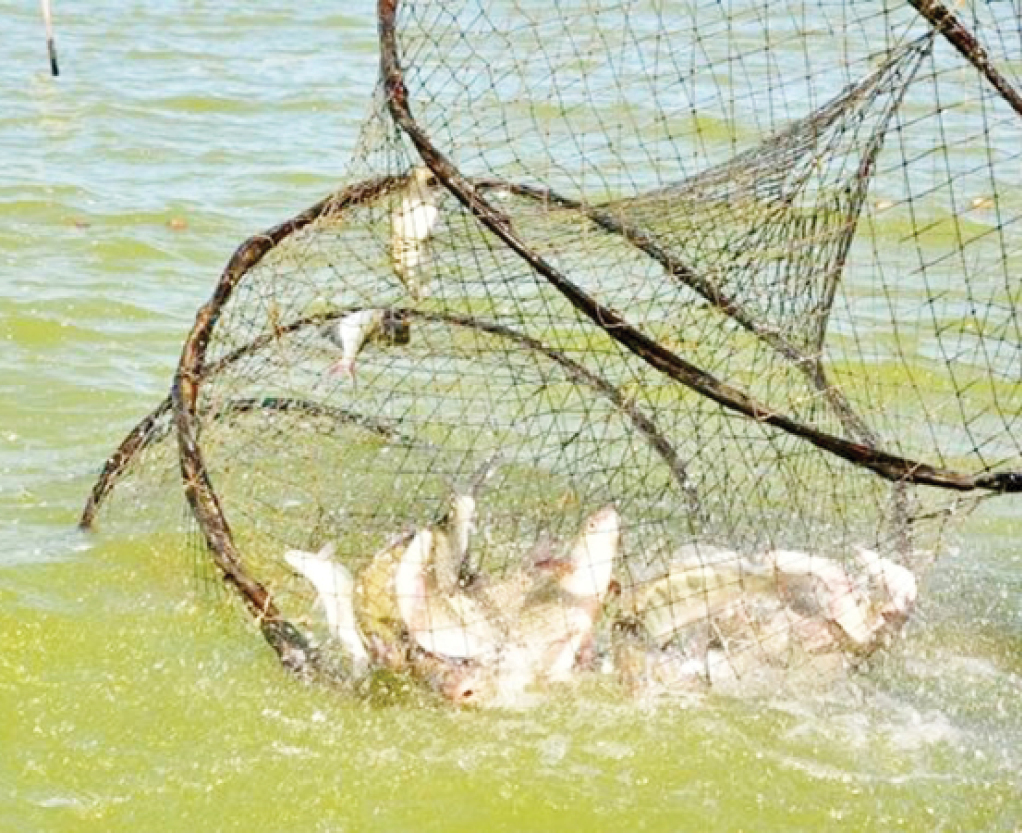During the rainy season in Delta State, the landscape transforms, particularly in Igbide community, Isoko-South Local Government Area, where the mighty Urie River swells to full capacity.
This river, nestled in Igbide community, holds a deep connection to the culture, economy and life of the local people – especially the women who rely on its waters for fishing.
However, at this time of the year, visiting the river becomes a challenge. The only way to access the island where the fisherwomen carry out their work is by speedboat, and even that, it is risky due to high water levels and the associated high cost of fuel.
According to some community members, the rivers opens for full activities during the Urie festival, an annual event held between February and March, “The festival is a time when the river is open for fishing after the waters recede, marking the end of the rainy season.”
During this period, the fisherwomen of Igbide take centre stage, showcasing both their traditional fishing skills and their role in sustaining the local economy.
An Isoko indigene and title holder in Igbide community, Odio Anthony Inyota, told Weekend Trust that, “Right now, you can’t get to the Urie River until the water goes down. But if you come in February or March, we’ll take you there. That’s when the Urie festival begins, and the women will return to their fishing camps. Until then, the river is closed for fishing.”
Tradition meets economic vitality
The fisherwomen of Igbide are central to the community’s livelihood because fishing has been an integral part of their lives for generations, passed down from their ancestors. The Urie River, steeped in tradition, serves as both a cultural symbol and an economic engine for these women and their families.
“Fishing is our heritage,” says Madam Eloho, a veteran fisherwoman. “Every year, we gather in February and wait for the river to be declared open. It’s our time to fish and bring in what we can sell. The entire community depends on it.
“During the festival, portions of the river are allocated to those willing to buy rights to fish. The women work in groups, heading to their respective portions at dawn, equipped with nets and traps passed down from our forefathers.
Mrs Okiemute, another fisherwoman, said “Our methods may be traditional, but the contribution we make to the local economy is profound. We don’t just fish for ourselves, people come from other parts of Isoko land to buy our fish. They resell it in their own communities, and that helps spread the wealth.
A day in the life of an Isoko fisherwoman: From dawn to dusk
The journey of an Isoko fisherwoman begins at dawn. As early as 6am, the women gather at a meeting point known as Owodokpokpo. From there, they distribute themselves to their designated areas along the river. Some days are more tasking than others, depending on the size of the catch and whether the women need to dry the fish before selling it.
Mrs Okiemute said, “We start early. Sometimes, we don’t come back the same day. We have camps along the river where we sleep, cook and eat. There’s security, so we don’t worry about safety. The next day, we continue until our baskets are full.
“The women’s work is not just about catching fish; it involves an entire ecosystem of labour. We dry our fish using traditional smoking methods to preserve them for sale. This method ensures that the fish remain fresh and it also helps us with food security, as well as economic sustainability.”
‘Our labour-intensive work: Contributions to local economy’
Fishing in the Urie River is not for the faint-hearted. It requires strength, patience and skills, Weekend Trust gathered. Many of the women learned the craft from their fathers or husbands, mastering the art of casting nets and reading the river’s waves to determine the best spots for fishing.
“Fishing is hard work,” Madam Eloho admits. “You have to know where to cast your net and when to wait. Sometimes, you sit for 30 or 40 minutes before pulling in your catch.”
Despite the physical demands, the benefits of their labour are far-reaching, Weekend Trust gathered. “The fish we catch not only feed our families, but also generate income for the entire community.”
Men are hired to assist in bringing the fish from the riverbank to the market.
Traditional methods and cultural significance
The fishing methods used by the Isoko women have not changed much over the years. They rely on nets and traps, just as their ancestors did, ensuring that the Urie Festival remains a celebration of cultural continuity.
“The festival isn’t just about fish,” explains Chief Omo, a community elder. “It’s about remembering who we are and where we come from. By maintaining these age-long practices, the Isoko women of Igbide play a crucial role in keeping our cultural heritage alive. Their work is not just a means of survival; it’s a way of honouring our ancestors.”
Challenges ahead: Rising costs and environmental changes
The rising cost of fuel has made it more expensive to travel to the fishing camps by boat, and environmental changes have altered the timing and availability of fish.
“Things are getting harder,” says Madam Eloho. “Fuel is expensive, and now, the river doesn’t give us as much fish as it used to. But we keep going. This is what we know. Despite these obstacles, the women of Igbide remain determined, our correspondent gathered.
‘Igbide fisherwomen are more than just workers’
Some of the fisherwomen and traders who spoke to Weekend Trust narrated their challenges as well as achievements.
According to Miss Joy Omeredo, “I can now afford three square meals since I started selling fish.”
Joy, who is a local fish seller in Delta State, said despite the fact that there are struggles in the fishing business, the rewards far outweigh the challenges because the business has become her primary source of livelihood in the face of Nigeria’s economic challenges.
“One of the major challenges I face in the fishing business is the lack of electricity. There’s no light, so it’s difficult to preserve fish till the next day. I don’t like my fish remaining till the next day because the stress of monitoring them is too much for me. Sometimes, many die before the next day. So, if I have any leftover, I would have to think of how to preserve them, as my deep freezer is useless without electricity,” she lamented.
The trader called on the government to address the power supply issues in her area because it is seriously affecting small businesses like hers.
“It would make a big difference if there was stable electricity. We are trying to survive, but these challenges make it hard,” she added.
Her concern echoes the experiences of many small business owners in the country, who continue to grapple with the harsh realities of poor infrastructure while striving to make ends meet.
Aother fish seller, Madam Rosslyn Umukoro, also expressed concerns over the declining profits in her business, attributing the downturn to the rising cost of fuel and transportation, which has affected customer turnout.
In an interview with our correspondent, Madam Umukoro explained that the profit she makes depends largely on the quantity of fish she sells each day.
“The profit I make depends on the quantity I sell. Sometimes, I sell a lot and at other times, I sell little. On days when I sell everything, I can make a profit of over N10,000. But if I don’t, I make less than N6,000,” she said.
The trader also noted that the rising fuel prices have driven customers away, as people are buying lesser quantities than they used to.
“Before now, I used to have regular customers, but because of the increase in fuel and transportation costs, people don’t buy as much as they used to,” she added.
Another fisherwoman, who is also a fish trader, decried the high cost of transportation, which she said has severely affected her business and customer base.
Mrs Ufuoma Naomi said, “I used to spend N600 on transportation to go and sell my fish and come back. But now, I spend N2,500 going and coming. You can see the difference”.
The trader added that her customers, who are also struggling with the harsh economy, often blame her for increasing the prices of her fish.
Ufuoma said, “But I try to explain to them the reality of the business. If I don’t adjust the price, I will be the one to lose. After selling, I will still have to pay transport home just like I paid to bring the goods to the market”.
Support for family
Mrs Blessing Etano, a single mother, who is using the fishing business to provide for her children, said despite the challenges, she remains determined.
She said, “I ventured into fishing because I am a single mother. I have to fish to survive and ensure that my children don’t lack the basic needs of life.
“Fishing is tough, but it has been my lifeline. I wake up early and go to the river, hoping for a good catch. It’s not always easy, but I have no choice but to keep pushing,” she added.
For Mrs Okiemute Dafe, a mother of six, fishing became a vital source of livelihood when her husband’s income as a civil servant could no longer sustain the family’s needs. Despite his efforts, the monthly salary he brought home could not provide for their large household.
Mrs Dafe, who has been in the fishing business for 10 years, shared how her determination and hard work have helped her raise two of her children, who recently graduated from the university.
As her husband continues to work as a civil servant, Mrs Dafe is urging the government and relevant authorities to recognise the efforts of women like her, who engage in small-scale businesses, to complement their household income.
“Two of my children graduated from the university last year. It hasn’t been easy, but I’m grateful that the little I make from fishing helped in supporting their education.
“I’ve been doing this for a decade now, and I hope for more support to expand my business,” she added.

 Join Daily Trust WhatsApp Community For Quick Access To News and Happenings Around You.
Join Daily Trust WhatsApp Community For Quick Access To News and Happenings Around You.

